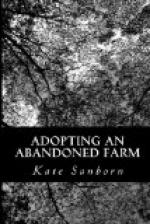The result was a perfect success; the pause at the close of each sentence had such a fine elocutionary effect.
In future, when longing to indulge in some new display, yield to another temptation, let me whisper “peacock” and be saved.
CHAPTER X.
LOOKING BACK.
Then you seriously suppose,
doctor, that gardening is good for the
constitution?
I do. For kings, lords,
and commons. Grow your own cabbages. Sow
your own turnips, and if you
wish for a gray head, cultivate
carrots.
THOMAS HOOD.
Conceit is not encouraged in the country. Your level is decided for you, and the public opinion is soon reported as something you should know.
As a witty spinster once remarked: “It’s no use to fib about your age in your native village. Some old woman always had a calf born the same night you were!”
Jake Corey was refreshingly frank. He would give me a quizzical look, shift his quid, and begin:
“Spent a sight o’ money on hens, hain’t ye? Wall, by next year I guess you’ll find out whether ye want to quit foolin’ with hens or not. Now, my hens doan’t git no condition powder, nor sun-flower seeds, nor no such nonsense, and I ain’t got no bone cutter nor fancy fountains for ’em; but I let ’em scratch for themselves and have their liberty, and mine look full better’n your’n. I’ll give ye one p’int. You could save a lot by engagin’ an old hoss that’s got to be killed. I’m allers looking round in the fall of the year for some old critter just ready to drop. Wait till cold weather, and then, when he’s killed, hang half of him up in the hen house and see how they’ll pick at it. It’s the best feed going for hens, and makes ’em lay right along. Doan’t cost nothin’ either.”
I had been asked to give a lecture in a neighboring town, and, to change the subject, inquired if he thought many would attend. Jake looked rather blank, took off his cap, scratched his head, and then said:
“I dunno. Ef you was a Beecher or a Gough you could fill the hall, or may be ef your more known like, and would talk to ’em free, you might git ’em, or if you’s going to sing or dress up to make ’em larf; but as ’tis, I dunno.” After the effort was over I tried to sound him as to my success. He was unusually reticent, and would only say: “Wall, the only man I heard speak on’t, said ’twas different from anything he ever heard.” This reminded me of a capital story told me by an old family doctor many years ago. It was that sort of anecdote now out of fashion with raconteurs—a long preamble, many details, a gradual increase of interest, and a vivid climax, and when told by a sick bed would sometimes weary the patient. A man not especially well known had given a lecture in a New Hampshire town without rousing much enthusiasm in his audience, and as he rode away on the top of the stage coach next morning he tried to get some sort of opinion from Jim Barker, the driver. After pumping in vain for a compliment the gentleman inquired: “Did you hear nothing about my lecture from any of the people? I should like very much to get some idea of how it was received.”




